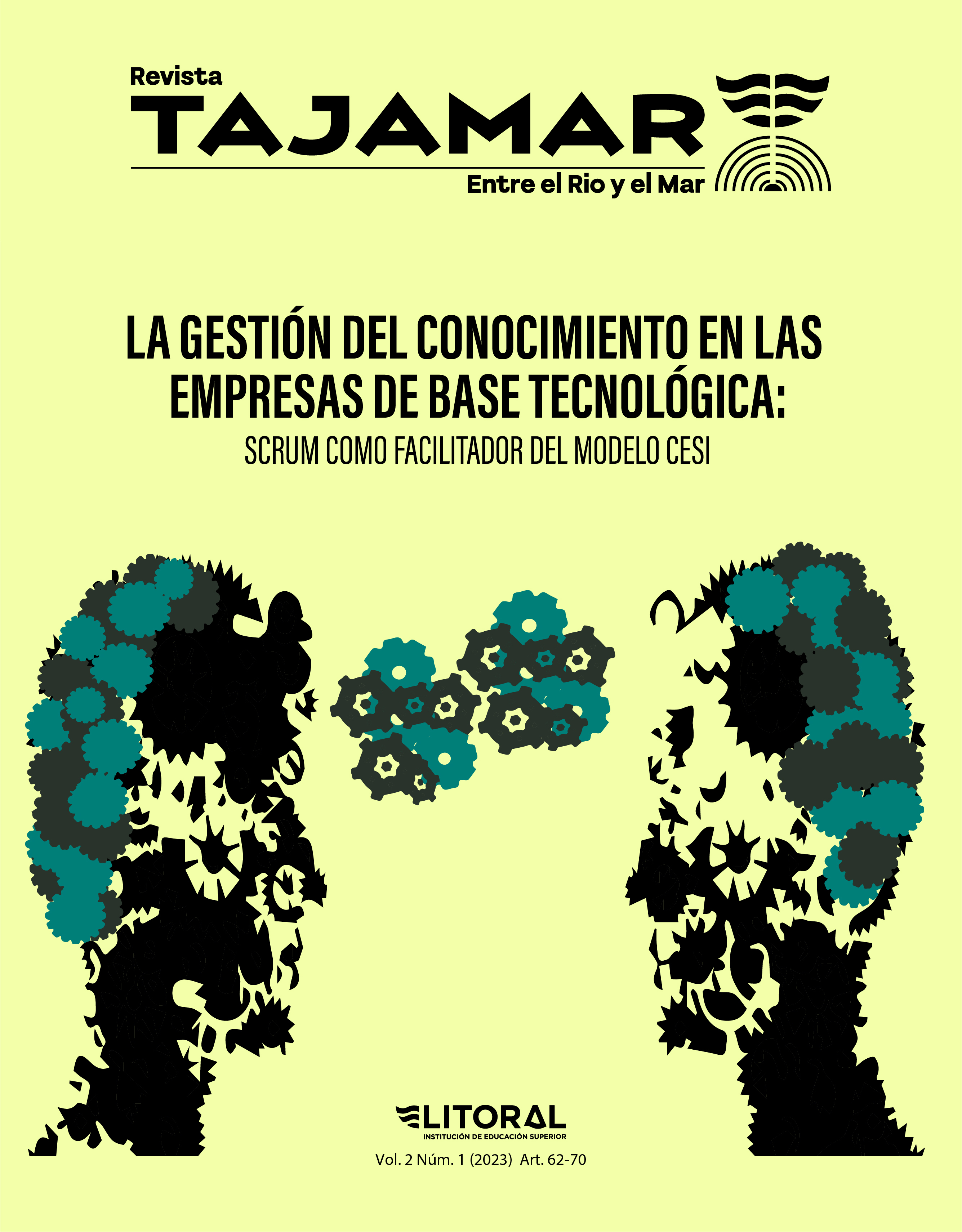LA GESTIÓN DEL CONOCIMIENTO EN LAS EMPRESAS DE BASE TECNOLÓGICA: SCRUM COMO FACILITADOR DEL MODELO CESI
Contenido principal del artículo
Resumen
La Gestión del Conocimiento es un factor crucial para la sostenibilidad de las organizaciones en la era del conocimiento y la cuarta revolución industrial. Aunque numerosos expertos y teóricos han explorado este tema, se observa que hay una menor cantidad de estudios centrados en la Gestión del Conocimiento en empresas de base tecnológica que utilizan marcos ágiles como SCRUM. Este documento examina cómo SCRUM puede contribuir a la Gestión del Conocimiento, particularmente en el contexto del modelo SECI de Nonaka y Takeuchi. La investigación se enfoca en analizar cómo SCRUM podría facilitar la implementación de acciones de gestión del conocimiento y propone la construcción de nuevos marcos teórico-conceptuales o modelos metodológicos ágiles para el desarrollo de tecnologías, alineados con el ciclo de Gestión del Conocimiento.
El estudio aborda primero el contexto general de la Gestión del Conocimiento en empresas de base tecnológica, realiza un análisis del estado del arte sobre estos conceptos y, finalmente, discute SCRUM como una posible alternativa para la Gestión del Conocimiento en este tipo de empresas. A diferencia de otros estudios que han explorado los roles dentro de SCRUM, esta reflexión se centra en el enfoque de las reuniones de SCRUM o "Daily Standups" como herramientas potenciales para la gestión del conocimiento.
Descargas
Detalles del artículo

Esta obra está bajo una licencia internacional Creative Commons Atribución-NoComercial-SinDerivadas 4.0.
Citas
Almeida, F., Miranda, E., & Falcão, J. (2019). Challenges and facilitators practices for knowledge management in large-scale scrum teams. Journal of Information Technology Case and Application Research, 21(2), 90–102.
Ammourah, B. A., & Pitchay, S. A. (2019). Conceptual framework of dynamic scrum model and knowledge management for software product management. Malaysian Journal of Science Health & Technology, 4.
Cerchione, R., Esposito, E., & Spadaro, M. R. (2016). A literature review on knowledge management in SMEs. Knowledge Management Research & Practice, 14(2), 169–177.
Chedid, M., Carvalho, T., & Teixeira, L. (2022). University-software industry collaboration: An empirical study based on knowledge management. Knowledge Management Research & Practice, 20(4), 593–605.
Coriguazi, D. M. C., Simon, A. T., & Assumpcao, M. R. P. (2017). Technology and knowledge management model for integration of cyber-physical systems (CPS) to the firms logistics processes. Revista Exacta, 15(4), 27–42.
Davenport, T. H. (1996). Some principles of knowledge management. Strategy & Business, 1(2), 34–40.
de Andrade, F. G., Araújo, C. K. C., Basso, S., Przybysz, A. L., & Francisco, A. C. (2020). The perception of knowledge management by small and medium-sized IT companies, Campos Gerais, Brazil. In Proceedings on 25th International Joint Conference on Industrial Engineering and Operations Management–IJCIEOM: The Next Generation of Production and Service Systems (pp. 522–531).
de Mello, R., da Costa, J. A., de Oliveira, B., Ribeiro, M., Fonseca, B., Gheyi, R., Garcia, A., & Tiengo, W. (2021). Decoding confusing code: Social representations among developers. In 2021 IEEE/ACM 13th International Workshop on Cooperative and Human Aspects of Software Engineering (CHASE) (pp. 11–20).
Fang, Y., Roofigari-Esfahan, N., & Anumba, C. (2018). A knowledge-based cyber-physical system (CPS) architecture for informed decision making in construction. In Construction Research Congress 2018 (pp. 662–672).
Gutiérrez, M. Á. G., & García, J. E. B. (2012). Generación y generalización del conocimiento en las empresas de base tecnológica.
Ihde, D. (1997). The structure of technology knowledge. Springer.
Lee, E. A. (2010). CPS foundations. In Proceedings of the 47th Design Automation Conference (pp. 737–742).
Liang, X., & Chen, H. (2020). The application of CPS in library management: A survey. Library Hi Tech, 38(1), 117–131.
Manesh, M. F., Pellegrini, M. M., Marzi, G., & Dabic, M. (2020). Knowledge management in the fourth industrial revolution: Mapping the literature and scoping future avenues. IEEE Transactions on Engineering Management, 68(1), 289–300.
Misra, S. C. (2014). Conceptual modeling for knowledge management to support agile software development. The Knowledge Engineering Review, 29(4), 496–511.
Nazarpouri, A. H., Sepahvand, R., & Feli, R. (2020). The effect of organisational and technological readiness on organisational intelligence and performance of customer relationship management through knowledge management process in knowledge-based and technology companies. International Journal of Innovation Management, 24(04), 2050076.
Nonaka, I., Toyama, R., & Konno, N. (2000). SECI, Ba and leadership: A unified model of dynamic knowledge creation. Long Range Planning, 33(1), 5–34.
Robledo, J. C. (2012). Facilitadores de la creación de conocimiento organizacional. Universidad EAFIT. Retrieved from https://repository.eafit.edu.co/bitstream/handle/10784/1473/RobledoFernandez_JuanCarlos_2013.pdf
Rodríguez Melon, M. (2016). The social representation of success in IT projects in Brazil from the IT professionals’ perspective.
Simón, E. K. (2003). La creación de empresas de base tecnológica: Una experiencia práctica. Proyecto para la Promoción de Empresas Innovadoras de Base Tecnológica. España.
Spanellis, A., MacBryde, J., & Dörfler, V. (2021). A dynamic model of knowledge management in innovative technology companies: A case from the energy sector. European Journal of Operational Research, 292(2), 784–797.
Tavakoli, Z., & Gandomani, T. J. (2016). Adaptation of Nonaka’s and Takeuchi’s knowledge management model to Scrum roles. International Journal of Software Engineering and Technology, 2(1).
Tenório, N., Pinto, D., Silva, M. J., de Almeida, I. C., & Bortolozzi, F. (2020). Knowledge management in the software industry: How Scrum activities support a knowledge management cycle. Navus: Revista de Gestão e Tecnologia, 10, 20.
Valacherry, A. K., & Pakkeerappa, P. (2020). Knowledge management in the software industry: Creating value through knowledge application. Journal of Creating Value, 6(2), 249–270.
Vasanthapriyan, S., Tian, J., & Xiang, J. (2015). A survey on knowledge management in software engineering. In 2015 IEEE International Conference on Software Quality, Reliability and Security-Companion (pp. 237–244).
